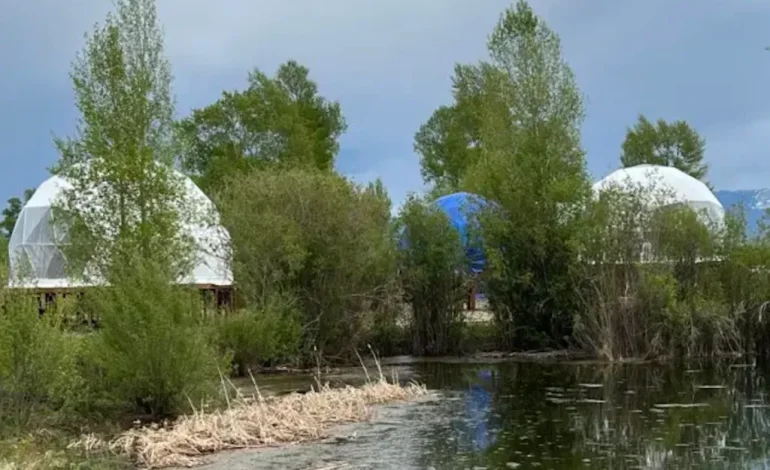Teton Glamping Hotel Fixes Septic Violation, Pollution Source Remains Unknown

Operators of the Tammah tent hotel near Teton Village have resolved issues with their septic system, Wyoming regulators announced Friday, but the source of groundwater pollution near the resort remains undetermined, Oil City News reports.
The Wyoming Department of Environmental Quality (DEQ) issued a notice of compliance after Basecamp Hospitality, Tammah’s Utah-based parent company, corrected deficiencies highlighted in an October 29 violation order. Inspections of the glamping resort’s sand mound septic system had revealed water leaking from a raised leach field due to a confining clay layer beneath the sand mound.
“Basecamp implemented corrective actions that addressed the underlying confining [clay] layer so that treated effluent can now infiltrate into the ground as the system was designed to do,” the DEQ stated.
Despite fixing the septic system, the DEQ remains unsure what caused high ammonia levels in a groundwater monitoring well on the property. The agency cleared the resort to resume septic system operations after additional testing showed that the sand mound system was not the pollution source.
“The cause of elevated ammonia in the groundwater monitoring well is currently unknown,” the DEQ stated.
The Department added that Basecamp provided samples from between the septic system and the monitoring well that ruled out the septic as the culprit.
The issue has fueled ongoing controversy surrounding the Tammah resort, which operates on state school trust land near sensitive wetlands. The project was approved by state officials but faced significant pushback from Teton County leaders and environmental groups.
Teton County Commission Chairman Luther Propst expressed reservations, stating he would withhold comment until the DEQ released its data for independent review. Similarly, Dan Heilig of the advocacy group Protect Our Water Jackson Hole said his organization would wait to evaluate the DEQ’s findings before commenting further.
The pollution issue came to light after monitoring samples taken in September and October showed ammonia levels exceeding state standards in the Class 1 Fish Creek watershed. By October, ammonia levels in the monitoring well had risen even further, prompting the DEQ to order the septic system shut down and require human waste to be trucked off-site for treatment.
Following further groundwater testing in response to the DEQ’s orders, Basecamp determined that its septic system was not the source of the contamination.








